Research Leadership Team
Professor Sarah Sawyer
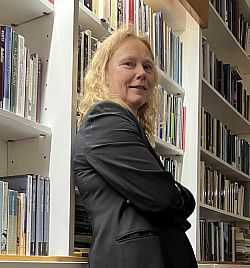 Associate Dean for Research and Innovation (ADRI)
Associate Dean for Research and Innovation (ADRI)
As Associate Dean for Research and Innovation, Sarah leads the research team in the Faculty of Media, Arts and Humanities.
She is Professor of Philosophy, Vice-Chair of the Royal Institute of Philosophy, Deputy Director of the Sussex Centre for Consciousness Science, and a Fellow of the Royal Society of Arts. Her research lies at the intersection of philosophy of mind, philosophy of language, metaphysics and epistemology, with a recent focus on conceptual engineering.
To find out more, visit Sarah's profile page.
Email: s.a.sawyer@sussex.ac.uk
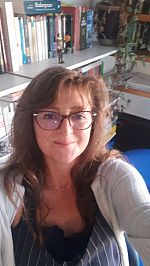 Dr Rachel Stenner
Dr Rachel Stenner
Faculty PGR Lead
The Faculty PGR Lead oversees strategic and operational plans for postgraduate researchers in the Faculty. The PGR Lead chairs the Faculty’s PGR Committee and represents the Faculty at the University’s PGR Board.
Rachel’s research is about the literature and culture of the late medieval and early modern periods, with a particular emphasis on Tudor writers, print culture, book and printing history. Rachel has published widely in these areas.
To find out more, visit Rachel's profile page.
Email: Rachel.Stenner@sussex.ac.uk
Dr Hannah Field
Faculty External Funding Lead
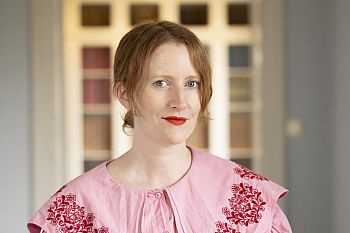 As Faculty External Funding Lead, Hannah helps colleagues in MAH to develop external research grant bids - from smaller bids to specialist funders to multi-million-pound, collaborative bids to national and international research councils - from initial idea through informal and formal peer review to submission. Working closely with both academic and Professional Services colleagues in the MAH research team, Hannah is eager to promote a collegial and intellectually curious research culture in MAH, celebrating colleagues’ many successes and making sure there are plenty more to come.
As Faculty External Funding Lead, Hannah helps colleagues in MAH to develop external research grant bids - from smaller bids to specialist funders to multi-million-pound, collaborative bids to national and international research councils - from initial idea through informal and formal peer review to submission. Working closely with both academic and Professional Services colleagues in the MAH research team, Hannah is eager to promote a collegial and intellectually curious research culture in MAH, celebrating colleagues’ many successes and making sure there are plenty more to come.
As an academic, Hannah specialises in Victorian studies, book history, and children’s literature criticism. Her monograph Playing with the Book: Victorian Movable Picture Books and the Child Reader came out with the University of Minnesota Press in 2019; it won prizes from the Children’s Literature Association and the Bibliographical Society of America. She is currently the Principal Investigator of the five-year European Research Council project PromPrint, leading a five-person team at the Sussex Digital Humanities Lab that will investigate copyright libraries and the texts they don’t want.
To find out more, visit Hannah's profile page.
Email: h.field@sussex.ac.uk
Dr Tanya Kant
Faculty Innovation, Industry and Engagement Lead
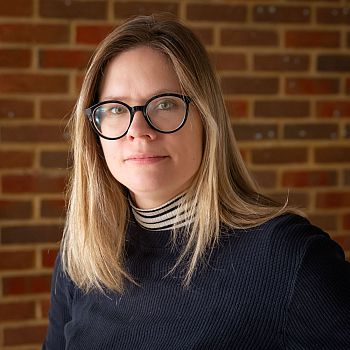 As Faculty Innovation, Industry and Engagement Lead, Tanya is responsible for guiding and supporting research to foster impactful innovation and knowledge exchange, especially through collaborations with industry and community partners. She works with research centres and colleagues across the Faculty – as well as external advisors on the Impact & Industry Advisory Board – to connect, create and co-curate with collaborators in the creative industries, local businesses and organisations, government, arts and conservation, and well-being.
As Faculty Innovation, Industry and Engagement Lead, Tanya is responsible for guiding and supporting research to foster impactful innovation and knowledge exchange, especially through collaborations with industry and community partners. She works with research centres and colleagues across the Faculty – as well as external advisors on the Impact & Industry Advisory Board – to connect, create and co-curate with collaborators in the creative industries, local businesses and organisations, government, arts and conservation, and well-being.
Tanya’s research focuses on generative AI, digital culture, media ethics, data and identity. She is author of Making It Personal: Algorithmic Personalization, Identity and Everyday Life (2020, Oxford University Press) and has published work on AI and algorithmic literacy, web economies, personalization, and bots. She is co-managing editor of open access publishing platform REFRAME and is co-investigator of the 'Algorithmic Autobiographies’ public engagement project. She has worked on research, impact and knowledge exchange projects with international arts festivals, Ofcom, Brighton and Hove Youth Participation Team, ASA, MIT and Full Fact amongst others.
To find out more, visit Tanya's profile page.
Email: T.Kant@sussex.ac.uk
Medeni Fordham
Senior Research Manager
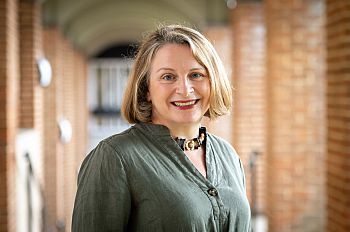 Medeni is the Senior Research Manager for the Faculty of Media, Arts and Humanities. She works closely with the Associate Dean for Research and Innovation, the Faculty External Funding Lead, the Faculty Innovation, Industry, and Engagement Lead, the Faculty PGR Lead, the REF Unit of Assessment Chairs and the Research Professional Services team to develop, support and improve the research experience and environment for researchers and postgraduate researchers in the new Faculty.
Medeni is the Senior Research Manager for the Faculty of Media, Arts and Humanities. She works closely with the Associate Dean for Research and Innovation, the Faculty External Funding Lead, the Faculty Innovation, Industry, and Engagement Lead, the Faculty PGR Lead, the REF Unit of Assessment Chairs and the Research Professional Services team to develop, support and improve the research experience and environment for researchers and postgraduate researchers in the new Faculty.
Medeni works collaboratively on the delivery of the REF, KEF and with teams within the Research Portfolio to manage research grant capture, knowledge exchange and impact development, research events and doctoral research. She develops projects and structures, such as the Early Career Researcher network and Advisory Board, that enable researchers to flourish. She has specific expertise in impact development and working with policymakers.
As an experienced HEI research manager working across science, arts and social science research areas, as well as working in arts management, Medeni can help from idea development, building and fostering relationships with external partners (arts, media, creative, cultural sector and heritage, NGOs and parliament and policy) to the strategic development and delivery of systems, events and external engagement activities in HEI environments.
Please contact Medeni if you would like to explore connections with the Faculty.
Email: M.Fordham@sussex.ac.uk